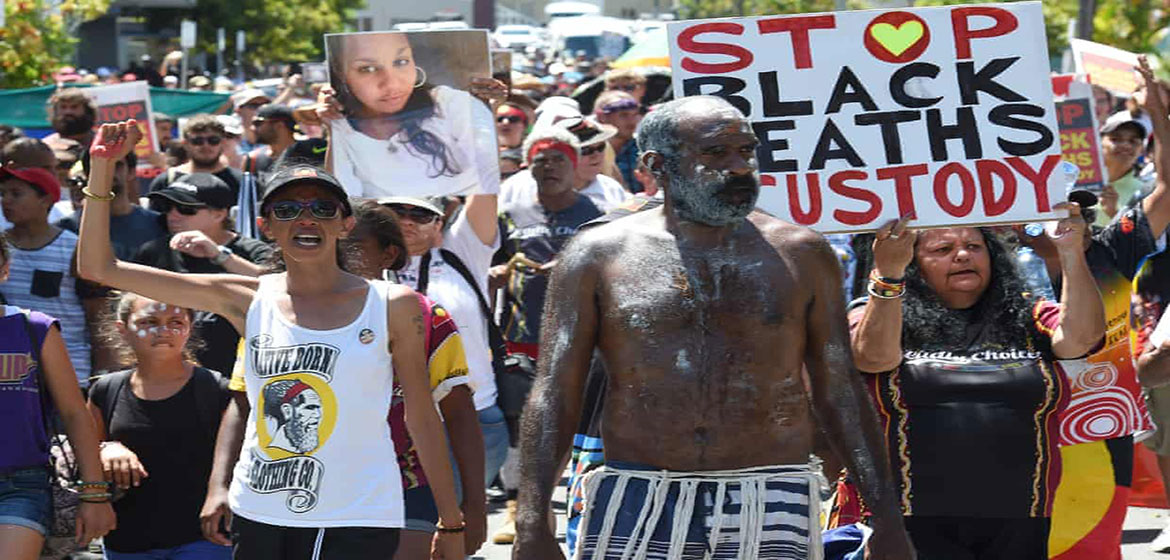Deloitte review of deaths in custody reveals that only two-thirds of landmark royal commission’s recommendations have been fully implemented
Lorena Allam and Calla Wahlquist
Almost 30 years after the royal commission into Aboriginal deaths in custody, only two-thirds of its recommendations have been fully implemented, and the rate of Indigenous incarceration has doubled, a major review has found.
The Deloitte Access Economics report was tabled in parliament on Wednesday after a Senate motion forced its release.
It comes two months after found that Indigenous people were continuing to die in custody in preventable circumstances.
The Deloitte report found that while the rate at which Indigenous people have died in custody has halved in the 27 years since the royal commission handed down its final report, the rate of incarceration has doubled.
The key finding of the royal commission was the need to reduce the rate at which Aboriginal and Torres Strait Islander people are jailed but, Deloitte’s report said, recommendations aimed at breaking the cycle of imprisonment and diverting people away from prison had the lowest rates of implementation nationally.
Of the 339 recommendations, 64% were fully implemented, 14% were mostly implemented, 16% were partly implemented and 6% were not implemented at all. Tasmania had the lowest rates of implementation nationally.
The report found that:
- Monitoring deaths in custody has “reduced over time” across all jurisdictions, and reporting of data about police custody was “an ongoing issue”.
- Only 55% of recommendations designed to keep people out of prison by using jail as the last resort have been implemented, such as non-custodial sentencing and diversionary programs.
- Prison safety had improved significantly but Aboriginal mental health workers were needed in jails.
- All jurisdictions needed to ensure more Aboriginal employment in health services and the provision of “culturally sensitive health care”.
- Some jurisdictions still failed to perform regular in-person cell checks of people in custody, particularly at police watch houses.
“While there have been positive steps, it is clear that further work is still required to address the disproportionately high and growing rates of incarceration among Aboriginal and Torres Strait Islander people,” the report said.
It was commissioned in December by the Indigenous affairs minister, Nigel Scullion, and made public today after the to produce the document, in response to reporting by Guardian Australia’s project.
Deaths Inside tracked 10 years worth of coronial data and and that mental health care in particular was often inconsistent and insufficient.
The Greens senator, Rachel Siewert, said urgent action is needed on justice targets, along with a “serious commitment to cooperation between commonwealth and state and territory governments”.
“Some of the key areas that have not been implemented relate to the cycle of offending, self-determination and non-custodial approaches,” Siewert said.
“These are key to addressing disadvantage and intergenerational trauma for First Nations peoples and some of the underlying causes relating to interactions with the justice system in the first place.
“The government has to stop using imprisonment as a way to deal with social issues and poverty,” Siewert said.
In a statement, Scullion said the findings of the review were “encouraging and confirm there has been significant progress made.”
“Many of the recommendations not fully implemented have been superseded by subsequent actions and policies, and ones not implemented are due to evidence regarding effective interventions evolving since 1991,” he said.
Scullion said the commonwealth was committed to working with states and territories to reduce incarceration rates.
Source:
Related to SDG 10: Reduced inequalities and SDG 16: Peace, justice and strong institutions



